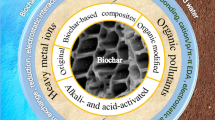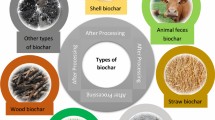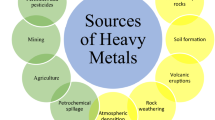Abstract
Effluent from electroplating industries contains various toxic heavy metal ions such as chromium, nickel, lead, cadmium, copper and zinc. Recovery of the valuable heavy metals by environment friendly approach for recycling in various useful applications could be significant from the perspectives of clean process development with techno-economic viability. Zinc is an important component of electroplating effluent found in high concentration (80–750 mg/L). The present study investigates on recovery of zinc from electroplating effluent using an efficient biochar synthesized from jute industrial wastes. Biochar characteristics and metal removal mechanisms were established using BET surface area, zeta potential, FESEM-EDAX, elemental mapping, XRD, FTIR, XPS, XRF, Raman spectroscopy and roles played by functional groups. Optimum adsorption capacity of 526.32 mg g−1 was obtained for Zn(II). Zn(II) binding was achieved by ion exchange, complexation with functional groups, electrostatic interactions, adsorption and micro-precipitation. The techno-economic analysis was performed for biochar prepared by chemical carbonization process and found competitive in comparison with other reported biochar obtained by slow pyrolysis process. Further, the disposal of the toxic metal-laden spent adsorbent is a critical issue that needs to be addressed. In the present study recycling potential of the exhausted Zn(II)-laden biochar was explored for the development of micro-fertilizer for plants and soil-fertility improvement. Application of the Zn(II)-laden biochar mixed with soil revealed a positive influence on Cicer arietinum seed germination, plant growth parameters, protein and chlorophyll a and b content. Significantly, there were no changes in the antioxidant enzymes activities, superoxide dismutase (SOD) and catalase (CAT) between the plants grown in control soil and different Zn(II)-laden biochar-mixed soil, suggesting that 15% of the Zn(II)-laden biochar could not be excess condition of zinc. The present study thus addresses an important aspect of solid waste management of jute industry considering significant volume of jute waste production of ~ 0.04 MT/day in India along with the remediation of electroplating and other metal-bearing industrial effluent. Further, micro-fertilizer application of the metal-laden sludge and soil productivity improvement at low cost, environmentally safe and fruitful manner makes the study significant from ecological as well as societal perspectives.
Graphical abstract






Similar content being viewed by others
References
Aebi HE (1983) Catalase. In: Bergmeyer HU (ed) Methods of enzymatic analyses 3. Verlag Chemie, Weinheim, pp 273–282
Agegnehu G, Bass AM, Nelson PN et al (2016) Benefits of biochar, compost and biochar–compost for soil quality, maize yield and greenhouse gas emissions in a tropical agricultural soil. Sci Total Environ 543:295–306. https://doi.org/10.1016/j.scitotenv.2015.11.054
Ahmadijokani F, Tajahmadi S, Bahi A, Molavi H, Rezakazemi M, Ko F, Aminabhavi TM, Arjmand M (2021) Ethylenediamine-functionalized Zr-based MOF for efficient removal of heavy metal ions from water. Chemosphere 264:128466. https://doi.org/10.1016/j.chemosphere.2020.128466
Ahmed MB, Zhou JL, Ngo HH et al (2016) Insight into biochar properties and its cost analysis. Biomass Bioenergy 84:76–86. https://doi.org/10.1016/j.biombioe.2015.11.002
Beltrame KK, Cazetta AL, de Souza PSC et al (2018) Adsorption of caffeine on mesoporous activated carbon fibres prepared from pineapple plant leaves. Ecotoxicol Environ Saf 147:64–71. https://doi.org/10.1016/j.ecoenv.2017.08.034
Bharti K, Pandey N, Shankhdhar D (2014) Effect of different zinc levels on activity of superoxide dismutases & acid phosphatases and organic acid exudation on wheat genotypes. Physiol Mol Biol Plants 20:41–48. https://doi.org/10.1007/s12298-013-0201-7
Carter S, Shackley S, Sohi S et al (2013) The impact of biochar application on soil properties and plant growth of pot grown lettuce (Lactuca sativa) and cabbage (Brassica chinensis). Agron 3(2):404–418. https://doi.org/10.3390/agronomy3020404
Chen Y, Cui J, Tian X et al (2017) Effect of straw amendment on soil Zn availability and ageing of exogenous water soluble Zn applied to calcareous soil. PLoS ONE 12:1–16. https://doi.org/10.1371/journal.pone.0169776
Cole AJ, Paul NA, de Nys R et al (2017) Good for sewage treatment and good for agriculture: Algal based compost and biochar. J Environ Manage 200:105–113. https://doi.org/10.1016/j.jenvman.2017.05.082
Comprehensive Industry Document on Electroplating Industries (Coinds) (2007) Central Pollution Control Board, Ministry of Environment and Forests
Ding Y, Liu Y, Liu S et al (2016a) Biochar to improve soil fertility. A review. Agron Sustain Dev 36:36. https://doi.org/10.1007/s13593-016-0372-z
Ding Z, Hu X, Wan Y, Wang S, Gao B (2016b) Removal of lead, copper, cadmium, zinc, and nickel from aqueous solutions by alkali-modified biochar: batch and column tests. J Ind Eng Chem 33:239–245. https://doi.org/10.1016/j.jiec.2015.10.007
Duan L, Yu W, Li Z (2017) Analysis of structural changes in jute fibers after peracetic acid treatment. J Eng Fibers Fabr 12(1):33–42. https://doi.org/10.1177/155892501701200104
Fornes F, Belda RM, Lidòn A (2015) Analysis of two biochars and one hydrochar from different feedstock: focus set on environmental, nutritional and horticultural considerations. J Clean Prod 86:40–48. https://doi.org/10.1016/j.jclepro.2014.08.057
Garcia-Perez M, Brady M, Tanzil AH (2019) Biochar Production in biomass power plants: techno-economic and supply chain analyses, a report for the waste to fuels technology partnership 2017–2019 biennium: advancing organics management in Washington State. Center for Sustaining Agriculture and Natural Resources, Washington State University
Giannopolitis CN, Ries SK (1977) Superoxide dismutases occurrence in higher plants. Plant Physiol 59:309–314
Greenberg AE, Eaton AD, Clesceri LS, Rice EW (2005) Standard methods for the examination of water and wastewater. 21st ed., APHA, AWWA, WEF, Washington, DC
Hien NV, Valsami-Jones E, Vinh NC, Phu TT, Tam NTT, Lynch I (2020) Effectiveness of different biochar in aqueous zinc removal: Correlation with physicochemical characteristics. Bioresour Technol Report 11:100466. https://doi.org/10.1016/j.biteb.2020.100466
Hoslett J, Ghazal H, Ahmad D et al (2019) Removal of copper ions from aqueous solution using low temperature biochar derived from the pyrolysis of municipal solid waste. Sci Total Environ 673:777–789. https://doi.org/10.1016/j.scitotenv.2019.04.085
Hosseini SS, Bringas E, Tan NR et al (2016) Recent progress in development of high performance polymeric membranes and materials for metal plating wastewater treatment: a review. J Water Process Eng 9:78–110. https://doi.org/10.1016/j.jwpe.2015.11.005
Jain R, Jordan N, Schild D et al (2015) Adsorption of zinc by biogenic elemental selenium nanoparticles. Chem Eng J 260:855–863. https://doi.org/10.1016/j.cej.2014.09.057
Jiang L, Zhang D, Song F et al (2013) Effects of zinc on growth and physiological characters of flag leaf and grains of winter wheat after anthesis. Adv J Food Sci Technol 5(5):571–577. https://doi.org/10.19026/ajfst.5.3129
Khan TA, Mukhlif AA, Khan EA (2017) Uptake of Cu2+ and Zn2+ from simulated wastewater using muskmelon peel biochar: isotherm and kinetic studies Egyptian. J Basic Appl Sci 4:236–248. https://doi.org/10.1016/j.ejbas.2017.06.006
Khan TA, Khan EA, Khan S (2016) Adsorptive uptake of basic dyes from aqueous solution by novel brown linseed deoiled cake activated carbon: equilibrium isotherms and dynamics. J Environ Chem Eng 4:3084–3095. https://doi.org/10.1016/j.jece.2016.06.009
Kosesakal T, Unal M (2009) Role of zinc deficiency in photosynthetic pigments and peroxidase activity of tomato seedlings, IUFS. J Biol 68:113–120. https://doi.org/10.18478/IUFSJB.62201
Kumar K, Saini A, Bhaskar T (2020) Hydochar and biochar: production, physicochemical properties and techno-economic analysis. Biores Technol 310:123442. https://doi.org/10.1016/j.biortech.2020.123442
Li AY, Deng H, Jiang YH et al (2020) (2020) Superefficient removal of heavy metals from wastewater by Mg-loaded biochars: adsorption characteristics and removal mechanisms. Langmuir 36:9160–9174. https://doi.org/10.1021/acs.langmuir.0c01454
Li H, Dong X, da Silva EB et al (2017) Mechanisms of metal sorption by biochars: biochar characteristics and Modifications. Chemosphere 178:466–478. https://doi.org/10.1016/j.chemosphere.2017.03.072
Li S, Chen G (2018) Thermogravimetric, thermochemical, and infrared spectral characterization of feestocks and biochar derived at different pyrolysis temperatures. Waste Manage 78:198–207. https://doi.org/10.1016/j.wasman.2018.05.048
Lowry OH, Rosenbrough NJ, Farr AL et al (1951) Protein measurement with the Folin phenol reagent. J Biol Chem 193:265–275
Maroušek J, Hašková S, Zeman R et al (2014) Nutrient management in processing of steam-exploded lignocellulose phytomass. Chem Eng Technol 37(11):1–5. https://doi.org/10.1002/ceat.201400341
Maroušek J, Kolář L, Strunecký O et al (2020a) Modified biochars present an economic challenge to phosphate management in wastewater treatment plants. J Cleaner Product 272:123015. https://doi.org/10.1016/j.jclepro.2020.123015
Maroušek J, Maroušková A, Kůs T (2020b) Shower cooler reduces pollutants release in production of competitive cement substitute at low cost. Energy Sour Part A Recov Util Environ Eff 1:1. https://doi.org/10.1080/15567036.2020.1825560
Micheal OK, Ogbujor DA, Oghenerho EA (2017) Effect of biochar on soil properties and yield of cucumber (Cucumis sativus L). Int J Soil Sci Agron 4:131–142
Nyamunda BC, Chivhanga T, Guyo U, Chigondo F (2019) Removal of Zn (II) and Cu (II) ions from industrial wastewaters using magnetic biochar derived from water hyacinth. Hindawi J Eng 5656983:1–11. https://doi.org/10.1155/2019/5656983
Oladipo AA, Ahaka EO, Gazi M (2019) High adsorptive potential of calcined magnetic biochar derived from banana peels for Cu2+, Hg2+, and Zn2+ ions removal in single and ternary systems. Environ Sci Pollut Res 26(31):31887–31899. https://doi.org/10.1007/s11356-019-06321-5
Palansooriya KN, Ok YS, Awad YM et al (2019) Impacts of biochar application on upland agriculture: a review. J Environ Manage 234:52–64. https://doi.org/10.1016/j.jenvman.2018.12.085
Ramrakhiani L, Ghosh S, Majumdar S (2016) Surface modification of naturally available biomass for enhancement of heavy metal removal efficiency, upscaling prospects, and management aspects of spent biosorbents: a Review. Appl Biochem Biotechnol 180:41–78. https://doi.org/10.1007/s12010-016-2083-y
Ramrakhiani L, Ghosh S, Mandal AK et al (2019) Utilization of multi-metal laden spent biosorbent for removal of glyphosate herbicide from aqueous solution and its mechanism elucidation. Chem Eng J 361:1063–1077. https://doi.org/10.1016/j.cej.2018.12.163
Ramrakhiani L, Halder A, Majumder A et al (2017) Industrial waste derived biosorbent for toxic metal remediation: mechanism studies and spent biosorbent management. Chem Eng J 308:1048–1064. https://doi.org/10.1016/j.cej.2016.09.145
Ramrakhiani L, Majumder R, Khowala S (2011) Removal of hexavalent chromium by heat inactivated fungal biomass of Termitomyces clypeatus: surface characterization and mechanism of biosorption. Chem Eng J 171:1060–1068. https://doi.org/10.1016/j.cej.2011.05.002
Ray DP, Ghosh RK, Das I et al (2017) Nanocellulose extraction from jute wastes through chemical pre-treatment. J Agroec Nat Resour Manage 4(2):181–183
Reddy DHK, Vijayaraghavan K, Kim JA et al (2017) Valorisation of post-sorption materials: opportunities, strategies, and challenges. Adv Colloid Interface Sci 242:35–58. https://doi.org/10.1016/j.cis.2016.12.002
Roberts DA, Paul NA, Cole AJ et al (2015) From waste water treatment to land management: conversion of biomass to biochar for soil amelioration and the fortification of crops with essential trace elements. J Environ Manag 157:60–68. https://doi.org/10.1016/j.jenvman.2015.04.016
Rodríguez-Vila A, Selwyn-Smith H, Enunwa L, Smail I, Covelo EF, Sizmur T (2018) Predicting Cu and Zn sorption capacity of biochar from feedstock C/N ratio and pyrolysis temperature Environ. Sci Pollut Res 25:7730–7739. https://doi.org/10.1007/s11356-017-1047-2
Singh RK, Ujwal A, Chaluvadi S (2018) Study of various pretreatments on waste jute caddies for the production of ethanol. Int J Sci Eng Manage 3(4):20–24
Song J, Zhang S, Li G, Du Q, Yang F (2020) Preparation of montmorillonite modified biochar with various temperatures and their mechanism for Zn ion removal. J Hazard Mater 391:121692. https://doi.org/10.1016/j.jhazmat.2019.121692
Suhas VK, Gupta PJM, Carrott R et al (2016) Cellulose: a review as natural, modified and activated carbon adsorbent. Biores Technol 216:1066–1076. https://doi.org/10.1016/j.biortech.2016.05.106
Venkatesh G, Gopinath KA, Sammi Reddy K et al (2018) Biochar Production and its Use in Rainfed Agriculture: Experiences from CRIDA. CRIDA-NICRA Research Bulletin 02/2018, ICAR - Central Research Institute for Dryland Agriculture, Hyderabad
Vikrant K, Kim KH, Ok YS et al (2018) Engineered/designer biochar for the removal of phosphate in water and wastewater. Sci Total Environ 616–617:1242–1260. https://doi.org/10.1016/j.scitotenv.2017.10.193
Wei J, Tu C, Yuan G et al (2019) Assessing the effect of pyrolysis temperature on the molecular properties and copper sorption capacity of a halophyte biochar. Environ Pollut 251:56–65. https://doi.org/10.1016/j.envpol.2019.04.128
Xu R, Zhou G, Tang Y et al (2015) New double network hydrogel adsorbent: Highly efficient removal of Cd(II) and Mn(II) ions in aqueous solution. Chem Eng J 275:179–188. https://doi.org/10.1016/j.cej.2015.04.040
Yan G, Viraraghavan T (2008) Mechanism of biosorption of heavy metals by Mucor rouxii. Eng Life Sci 8(4):363–371. https://doi.org/10.1002/elsc.200820237
Yang F, Zhang S, Sun Y, Cheng K, Li J, Tsang DCW (2018) Fabrication and characterization of hydrophilic corn stalk biochar-supported nanoscale zerovalent iron composites for efficient metal removal. Bioresour Technol 265:490–497. https://doi.org/10.1016/j.biortech.2018.06.029
Yang X, Wan Y, Zheng Y et al (2019) Surface functional groups of carbon-based adsorbents and their roles in the removal of heavy metals from aqueous solutions: a critical review. Chem Eng J 366:608–621. https://doi.org/10.1016/j.cej.2019.02.119
Yao Y, Gao B, Chen J et al (2013) Engineered biochar reclaiming phosphate from aqueous solutions: mechanisms and potential application as a slow-release fertilizer. Environ Sci Technol 47:8700–8708. https://doi.org/10.1021/es4012977
Acknowledgements
The financial support to LR from the Department of Science and Technology (DST), Government of India, vide grant no. DST/WOS-B/2017/111-ETD dated 10.05.2018 and Council of Scientific & Industrial Research (CSIR), India, are gratefully acknowledged.
Author information
Authors and Affiliations
Corresponding author
Ethics declarations
Conflict of interest
The authors have declared no conflicts of interest for this research article.
Additional information
Publisher's Note
Springer Nature remains neutral with regard to jurisdictional claims in published maps and institutional affiliations.
Rights and permissions
About this article
Cite this article
Ramrakhiani, L., Ghosh, S. & Majumdar, S. Heavy metal recovery from electroplating effluent using adsorption by jute waste-derived biochar for soil amendment and plant micro-fertilizer. Clean Techn Environ Policy 24, 1261–1284 (2022). https://doi.org/10.1007/s10098-021-02243-4
Received:
Accepted:
Published:
Issue Date:
DOI: https://doi.org/10.1007/s10098-021-02243-4




